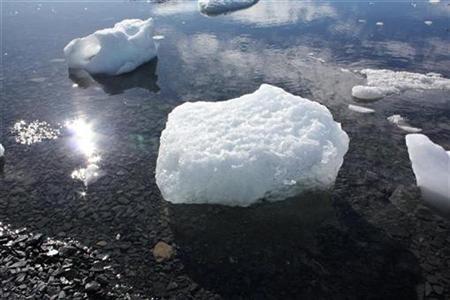Date: 19-Mar-09
Country: NORWAY
Author: Alister Doyle, Environment Correspondent
Temperature Rise May Trigger West Antarctic Thaw Photo: Alister Doyle

Icebergs grind against the shallows off the Rothera
base on the Antarctic Peninsula, January 25, 2009.
Photo: Alister Doyle
OSLO - The West Antarctic ice sheet may start to collapse if sea
temperatures rise by 5 degrees Celsius (9 degrees Fahrenheit), triggering a
thaw that would raise world ocean levels by 5 meters (16 ft), U.S.
scientists said.
Such a rise in sea levels -- taking thousands of years -- would swamp many
coasts and cities and wipe some low-lying Pacific islands off the map.
West Antarctica, the part of the frozen continent most vulnerable to climate
change, has thawed several times in the past few million years, most
recently 400,000 years ago, according to Thursday's edition of the journal
Nature.
The study "suggests the Western Antarctic ice sheet will begin to collapse
when nearby ocean temperatures warm by roughly 5 C," David Pollard of
Pennsylvania State University and Robert DeConto of the University of
Massachusetts wrote.
The study helps plug big gaps in understanding Antarctica's likely reaction
to modern global warming by improving knowledge of the history of the ice.
Pollard told Reuters the 5 C estimate for triggering a collapse was a rough
guide, based on an computer model. The bigger East Antarctic ice sheet had
not thawed in past warm periods studied.
The U.N. Climate Panel has projected a best estimate that world atmospheric
temperature will rise by between 1.8 and 4.0 Celsius by 2100 because of
emissions of greenhouse gases that could bring floods, droughts, heatwaves
and more powerful storms.
Higher rises were possible unless the world reined in the growth of
emissions, it said. Oceans temperatures lag far behind the rise in air
temperatures.
"The required ocean warmings, of the order of 5 Celsius, may well take
several centuries to develop," wrote Philippe Huybrechts of Vrije University
in Brussels in a commentary.
"But such an outcome could result from the accumulation of total
greenhouse-gas emissions projected for the twenty-first century, if
emissions are not greatly reduced," he wrote.
A related paper in Nature suggested that past collapses of the West
Antarctic ice were linked to the earth's rotation.
"The pattern of collapse suggests an influence of 40,000-year cycles in the
tilt of Earth's rotational axis," Nature said of the study led by scientists
in New Zealand.
(Editing by Matthew Jones)
© Thomson Reuters 2009 All rights reserved
